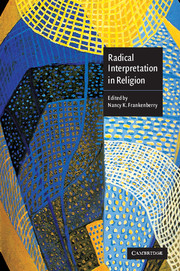Book contents
- Frontmatter
- Contents
- Notes on the contributors
- Preface
- Acknowledgments
- PART I PRAGMATICS
- PART II CULTURE AND COGNITION
- Introduction
- 5 “The Chinese believe in spirits”: belief and believing in the study of religion
- 6 On interpreting the world religiously
- 7 Are religious beliefs counter-intuitive?
- PART III SEMANTICS
- Select bibliography
- Index
6 - On interpreting the world religiously
Published online by Cambridge University Press: 13 November 2009
- Frontmatter
- Contents
- Notes on the contributors
- Preface
- Acknowledgments
- PART I PRAGMATICS
- PART II CULTURE AND COGNITION
- Introduction
- 5 “The Chinese believe in spirits”: belief and believing in the study of religion
- 6 On interpreting the world religiously
- 7 Are religious beliefs counter-intuitive?
- PART III SEMANTICS
- Select bibliography
- Index
Summary
Humans come into the world with a problem: how to interpret what is going on out there and in here. Of course, unless they have a disorder (for example, autism), they seem to handle the situation quite well. They learn very quickly about the ordinary kinds of things that there are in the world. They also learn about the properties of things. And they seem to acquire linguistic skills effortlessly. They even read minds: the curl of the lip, the raised eyebrow, the look of scorn, the eyes sparkling with joy. They also see faces in the clouds, meaning in the drop of a glove, and God in the eye of the storm. Cognitive science has spent the last five decades theorizing about the processes that lead to the acquisition of such knowledge. With the aid of cognitive scientists' clever experiments we now seem to know at least a little bit more about intuitive physics, intuitive biology, intuitive psychology, and intuitive quantification. My interest lies in the areas of the structure and acquisition of religious knowledge as this relates to such intuitive systems. I am particularly concerned about peoples' intuitive knowledge of agents and their actions and how this form of cognition undergirds religious concepts about culturally postulated superhuman agents.
My point would be that the process that leads to the development of religious ideas is the same process that leads to the development of ordinary ideas with minimal “tweaking” that makes it possible for us to distinguish the former from the latter.
- Type
- Chapter
- Information
- Radical Interpretation in Religion , pp. 117 - 128Publisher: Cambridge University PressPrint publication year: 2002
- 1
- Cited by



